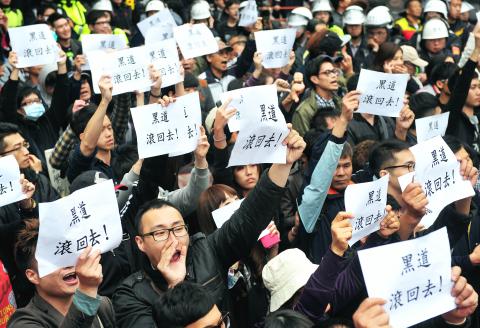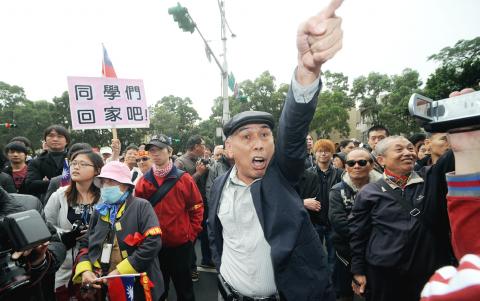The political deadlock between students occupying the Legislative Yuan and President Ma Ying-jeou (馬英九) is unlikely to end soon, because Ma is not willing to concede and has been evading the students’ demands, Democratic Progressive Party (DPP) officials said yesterday.
“When students demanded the organization of a citizens’ constitutional conference, Ma said he would convene a national trade conference instead. Knowing Ma, that was the kind of thing he always did — evading the core issue and shifting the focus to something else,” DPP Policy Research Committee executive director Joseph Wu (吳釗燮) said.
“Getting right to the point is not Ma’s style,” Wu said.

Photo: Chien Jung-fong, Taipei Times
While the DPP supports the causes and demands of the Sunflower movement — which has captured the country’s attention since the students stormed and occupied the legislative floor on March 18, and asked the government to withdraw and renegotiate the controversial deal amid concern it would severely undermine Taiwan’s economy — the party currently has no plan to intervene in the movement, Wu said.
The DPP has been playing a supporting role in the movement and has no plan to change that, Wu said.
Department of International Affairs director Liu Shih-chung (劉世忠) said the biggest concern now is that Ma has no exit strategy and does not appear to plan one.

Photo: Liu Hsin-de, Taipei Times
“It seems like he would keep on playing the China card, trying to reassure people that everything would be fine after the trade pact takes effect,” Liu said.
“However, for some people, their worst fear is not how Ma would deal with pressure from China, but that the president has already established some sort of collaborative partnership with Beijing,” he added.
One of Ma’s biggest mistakes in the controversy is that he is still convinced that Taiwanese believe that economics and politics can be separated in dealing with cross-strait issues, Liu said.
That may have been the case before, but the ongoing mass protest shows that the public has come to realize that the service trade agreement would have greater political than economic implications, Liu said.
The DPP’s counterproposal to the service trade agreement has been relatively underreported since the student movement became the center of attention two weeks ago, DPP Department of China Affairs director Honigmann Hong (洪財隆) said.
After a comprehensive review and discussion with its think tank, the party recommended that at least 24 items on the trade agreement’s sector-specific commitment list — including banking, printing and publishing, and Type II telecommunications — should be reconsidered, he said.
Hong added that the DPP has never opposed free trade and signing free-trade agreements with other countries, but pursuing trade liberalization with China — which has not ruled out annexing Taiwan by force if necessary — requires greater scrutiny and transparency.

CALL FOR SUPPORT: President William Lai called on lawmakers across party lines to ensure the livelihood of Taiwanese and that national security is protected President William Lai (賴清德) yesterday called for bipartisan support for Taiwan’s investment in self-defense capabilities at the christening and launch of two coast guard vessels at CSBC Corp, Taiwan’s (台灣國際造船) shipyard in Kaohsiung. The Taipei (台北) is the fourth and final ship of the Chiayi-class offshore patrol vessels, and the Siraya (西拉雅) is the Coast Guard Administration’s (CGA) first-ever ocean patrol vessel, the government said. The Taipei is the fourth and final ship of the Chiayi-class offshore patrol vessels with a displacement of about 4,000 tonnes, Lai said. This ship class was ordered as a result of former president Tsai Ing-wen’s (蔡英文) 2018

‘SECRETS’: While saying China would not attack during his presidency, Donald Trump declined to say how Washington would respond if Beijing were to take military action US President Donald Trump said that China would not take military action against Taiwan while he is president, as the Chinese leaders “know the consequences.” Trump made the statement during an interview on CBS’ 60 Minutes program that aired on Sunday, a few days after his meeting with Chinese President Xi Jinping (習近平) in South Korea. “He [Xi] has openly said, and his people have openly said at meetings, ‘we would never do anything while President Trump is president,’ because they know the consequences,” Trump said in the interview. However, he repeatedly declined to say exactly how Washington would respond in

WARFARE: All sectors of society should recognize, unite, and collectively resist and condemn Beijing’s cross-border suppression, MAC Minister Chiu Chui-cheng said The number of Taiwanese detained because of legal affairs by Chinese authorities has tripled this year, as Beijing intensified its intimidation and division of Taiwanese by combining lawfare and cognitive warfare, the Mainland Affairs Council (MAC) said yesterday. MAC Minister Chiu Chui-cheng (邱垂正) made the statement in response to questions by Democratic Progressive Party (DPP) Legislator Puma Shen (沈柏洋) about the government’s response to counter Chinese public opinion warfare, lawfare and psychological warfare. Shen said he is also being investigated by China for promoting “Taiwanese independence.” He was referring to a report published on Tuesday last week by China’s state-run Xinhua news agency,

‘ADDITIONAL CONDITION’: Taiwan will work with like-minded countries to protect its right to participate in next year’s meeting, the foreign ministry said The US will “continue to press China for security arrangements and protocols that safeguard all participants when attending APEC meetings in China,” a US Department of State spokesperson said yesterday, after Beijing suggested that members must adhere to its “one China principle” to participate. “The United States insists on the full and equal participation of all APEC member economies — including Taiwan — consistent with APEC’s guidelines, rules and established practice, as affirmed by China in its offer to host in 2026,” the unnamed spokesperson said in response to media queries about China putting a “one China” principle condition on Taiwan’s